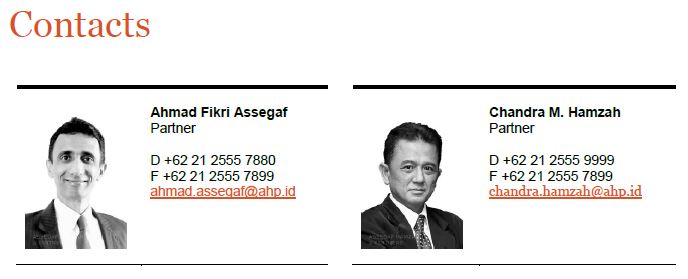Follow-Up Regulation On Disclosure Of Ultimate Beneficial Ownership
This year marked another step in Indonesia’s move towards a new era of corporate governance reform as the Indonesian government issued the Ministry of Law and Human Rights Regulation No. 15 of 2019 (“Ministry Regulation“) on disclosure of ultimate beneficial ownership. The Ministry Regulation is the implementing regulation of Presidential Regulation No. 13 of 2018 on the same subject (“Presidential Regulation“).
While the requirement to disclose ultimate beneficial ownership is not new in Indonesia, previous regulations issued in 2012 and 2017 only apply to banks and listed companies, respectively. Now, through the Presidential Regulation and the Ministry Regulation, all companies are required to disclose their ultimate beneficial ownership.
While there is no denying that this development is a positive move for Indonesia, it remains to be seen how this requirement would apply in practice, especially in dealing with complex ownership structure.
Observance of FATF
A discussion of the Ministry Regulation will inevitably touch on Indonesia’s participation in the Financial Action Task Force (“FATF“). Indonesia currently holds an observer status in FATF. The enactment of the Ministry Regulation seems to signal Indonesia’s strong interest and commitment in becoming a full member of the FATF.
In fact, the provisions in the two regulations closely mimic the recommendations under the FATF Guidance on Transparency and Beneficial Ownership (“FATF Guidance“). The FATF Guidance distinguishes the concepts of legal ownership and control. An essential element of FATF’s definition of ultimate beneficial ownership is that it extends beyond legal ownership and control to consider the notion of actual ownership and control. In other words, the focus is on the natural (not legal) persons who actually own and receive advantage of capital or assets of the legal person, as well as persons who exert effective control over it (regardless of the official position of such person).
The Ministry Regulation reflects the formulation of ultimate beneficial ownership under the FATF Guidance through certain criteria that can perhaps be summarised as follows:
- Ownership test: a person is the ultimate beneficial owner if they own more than 25% shares or voting rights of the company or receive more than 25% of the company’s annual profit.
- Control test: a person is the ultimate beneficial owner if they have the authority to appoint and remove directors and commissioners or have the power to influence or control the company.
- Benefit test: a person is the ultimate beneficial owner if they receive benefit from the company or are the actual owner of the funds for shares ownership in the company. In this case, both regulations specifically state that there is no prescribed threshold.
While the first two tests are clear, issues may arise in the application of the benefit test.
Application of the Benefit Test
In effect, the benefit test is a ‘catch-all’ provision, as a literal interpretation means that a company must disclose all of its beneficial owners. Unquestionably, all shareholders essentially receive benefit from the company, and consequently, our view is that a company must disclose all of its beneficial owners, regardless of whether control exists or not. Issues may arise when we are dealing with a complex ownership structure that makes it difficult to identify the actual beneficial owner. For example, in dealing with a listed company or funds, the natural beneficial owner is not easily identifiable.
Furthermore, the burden to disclose lies on the notary and the founder and executives of the company. This means that these parties must be more diligent in preparing and reporting information, specifically information dealing with beneficial ownership.
Conclusion
As illustrated above, by issuing the Ministry Regulation, the government imposes a wide disclosure obligation on companies. However, this obligation has not been supplemented with a detailed guidance.
Despite this, there is no denying that the issuance of the Ministry Regulation is a positive development for Indonesia. The higher level of compliance demanded of companies would mean that the public and authorities will benefit from the availability of a more comprehensive information, which will be beneficial for tax purposes, among others.
We hope that the government’s next move will be to issue a guidance relating to the implementation of this disclosure.

***
AHP Client Alert is a publication of Assegaf Hamzah & Partners. It brings an overview of selected Indonesian laws and regulations to the attention of clients but is not intended to be viewed or relied upon as legal advice. Clients should seek advice of qualified Indonesian legal practitioners with respect to the precise effect of the laws and regulations referred to in AHP Client Alert. Whilst care has been taken in the preparation of AHP Client Alert, no warranty is given as to the accuracy of the information it contains and no liability is accepted for any statement, opinion, error or omission.

